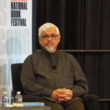East, west: stories
Description
More Details
9780394280936
9781501920639
Table of Contents
From the Book - First Canadian edition.
Similar Titles From NoveList
Similar Authors From NoveList
Published Reviews
Booklist Review
/*STARRED REVIEW*/ The secluded Rushdie's first collection of short stories, his first major work of fiction since the explosive 1989 novel The Satanic Verses, has been much anticipated and won't disappoint. These nine delectable stories are divided into three categories, "East," "West," and "East, West." The Eastern ones have a Thousand and One Nights flavor and are set in Rushdie's native Pakistan. The best in this grouping is "Good Advice Is Rarer than Rubies," about a young woman who goes to the British consulate for a visa so that she may live with her husband; her charm defeats the old man she encounters at the door, who wants to supply her with fraudulent papers. Rushdie's Western stories incorporate elements of magic realism and feature European settings. The most compelling is "Christopher Columbus and Queen Isabella of Spain Consummate Their Relationship," giving the affiliation between the encounterer of the New World and his regal sponsor a decided sexual angle. The stories in the "East/West" section bring the two worlds together, and the outstanding one of that beautiful trio is "The Harmony of the Spheres," about a deeply felt but tragically ended friendship between an Englishman and a Pakistani. Rushdie's brilliant style reinforces his stories' marvelous combination of dignity and poignancy. Though these stories were originally published in such periodicals as the New Yorker and the Atlantic, the collection will serve for many readers as an introduction to Rushdie's talent in the short story form. Expect high demand. (Reviewed November 1, 1994)067943965Xrad Hooper
Publisher's Weekly Review
``I... have ropes around my neck... pulling me East and West,'' says the narrator of one of the nine haunting stories in this collection by the author of The Satanic Verses. In three tales set in India (``East'') Rushdie surveys his native culture with a mixture of fondness, bemusement and dismay. ``The Prophet's Hair'' has some of the bite and daring that got Rushdie into hot water with Muslim fanatics. Stories set in England make up the ``West'' section. In a droll leg-puller, a fusty, prolix narrator retells events in Yorick's life, making Shakespeare's jester husband to the fair Ophelia, who has terrible breath, ``the rottenest-smelling exhalation in the State of Denmark.'' The ``permeation of the real world by the fictional is the symptom of the moral decay of our post-millennial culture,'' says a character in ``At the Auction of the Ruby Slippers,'' a futuristic piece displaying Rushdie's iconoclastic imagination and pardonably jaundiced view of life. But the full reach of his brilliant speculation and glancing wit are revealed in the stories in which East and West meet. The narrator of ``In the Harmony of the Spheres,'' a native Indian and perennial outsider in England, describes the suicide of his best friend, a British writer in the grip of paranoid schizophrenia, who manages posthumously to deal the narrator a psychic death blow. ``Chekov and Zulu,'' another teaser with layers of implication, is the best of the lot. Terse, hilarious, with a sinister edge and a stunning denouement, it follows two boyhood friends from India, forever known by their Star Trek nicknames, now diplomats (and secret spies)in England. (Jan.) (c) Copyright PWxyz, LLC. All rights reserved
Library Journal Review
The storied Rushdie (The Satanic Verses, LJ 12/88) provides nine stories, in groups of three, under the categories of "East," "West," and "East, West." Although these geographical headers do predict setting, theme, ethnicity, ethos, etc., the arrangement is much less satisfying than the stories themselves. Ironic, wry, and observant, this collection moves seamlessly from the simple O. Henry-ish "Good Advice Is Rarer than Rubies" to the complicated "The Courter," with its Four Seasons' song lyrics, coming-of-age theme, and crazy old porter, "Mixed-up," who turns out to be a chess Grand Master. The centerpiece may be "Yorick," a brilliant sendup of/tribute to Sterne, using the titular character's reference points in both Hamlet and Tristram Shandy; this story alone is worth the price of admission. For most collections, both academic and public. [Previewed in Prepub Alert, LJ 10/15/94.]-Robert E. Brown, Onondaga Cty. P.L., Syracuse, N.Y. (c) Copyright 2010. Library Journals LLC, a wholly owned subsidiary of Media Source, Inc. No redistribution permitted.
Kirkus Book Review
Nine stories, six of which have been previously published, that successfully explore the tensions and confusions that so often muddle relations between East and West. Divided into three groups, the stories are a reminder that Rushdie (Haroun and the Sea of Stories, 1991, etc.), the accomplished postmodern fabulist, is also a splendid realist storyteller who describes the human heart with clear-eyed sympathy. Grouped under the heading ``EAST,'' the first trio describes an encounter between a young Pakistani woman and an advice expert, who doesn't understand why the young woman is happy when the British Consulate rejects her application to join her aging fiancé in England (``Good Advice is Rarer than Rubies''); a poor young man, who has ``the rare quality of total belief in his dreams'' of moviedom success and who is sterilized because he believes the Indian government will give him a free radio (``The Free Radio''); and two children who try to have their greedy father robbed of a precious religious relic he is determined to add to his collection (``The Prophet's Hair''). Of the three stories in ``WEST,'' the most accomplished is ``At the Auction of the Ruby Slippers,'' which describes a world where auctioneers ``establish the value of our pasts, of our futures, of our lives'' as they auction off movie memorabilia and cultural icons that help us be what ``we fear we are not--somebody.'' The stories in the final section, ``EAST, WEST,'' are all set in England. A young Indian learns too late of a betrayal by a now-dead English friend (``The Harmony of the Spheres''); two Indian diplomats, Star Trek fans and old school chums, have a prophetic conversation while posted in England (``Chekov and Zulu''); and a young Indian, recalling the unlikely friendship between his ayah and an elderly chess player in London, refuses to choose between East and West (``The Courter''). A product of both worlds, Rushdie builds a safe passage over the seemingly unbridgeable with generous insight and wry humor in this distinguished collection.
Library Journal Reviews
The storied Rushdie (The Satanic Verses, LJ 12/88) provides nine stories, in groups of three, under the categories of "East," "West," and "East, West." Although these geographical headers do predict setting, theme, ethnicity, ethos, etc., the arrangement is much less satisfying than the stories themselves. Ironic, wry, and observant, this collection moves seamlessly from the simple O. Henry-ish "Good Advice Is Rarer than Rubies" to the complicated "The Courter," with its Four Seasons' song lyrics, coming-of-age theme, and crazy old porter, "Mixed-up," who turns out to be a chess Grand Master. The centerpiece may be "Yorick," a brilliant sendup of/tribute to Sterne, using the titular character's reference points in both Hamlet and Tristram Shandy; this story alone is worth the price of admission. For most collections, both academic and public. [Previewed in Prepub Alert, LJ 10/15/94.]-Robert E. Brown, Onondaga Cty. P.L., Syracuse, N.Y. Copyright 1994 Cahners Business Information.
Publishers Weekly Reviews
Rushdie's collection of nine highly postmodern stories probes the differences and connections between East and West, celebrating the hybrid nature of contemporary identity. (Jan.) Copyright 1995 Cahners Business Information.
Publishers Weekly Reviews
``I... have ropes around my neck... pulling me East and West,'' says the narrator of one of the nine haunting stories in this collection by the author of The Satanic Verses. In three tales set in India (``East'') Rushdie surveys his native culture with a mixture of fondness, bemusement and dismay. ``The Prophet's Hair'' has some of the bite and daring that got Rushdie into hot water with Muslim fanatics. Stories set in England make up the ``West'' section. In a droll leg-puller, a fusty, prolix narrator retells events in Yorick's life, making Shakespeare's jester husband to the fair Ophelia, who has terrible breath, ``the rottenest-smelling exhalation in the State of Denmark.'' The ``permeation of the real world by the fictional is the symptom of the moral decay of our post-millennial culture,'' says a character in ``At the Auction of the Ruby Slippers,'' a futuristic piece displaying Rushdie's iconoclastic imagination and pardonably jaundiced view of life. But the full reach of his brilliant speculation and glancing wit are revealed in the stories in which East and West meet. The narrator of ``In the Harmony of the Spheres,'' a native Indian and perennial outsider in England, describes the suicide of his best friend, a British writer in the grip of paranoid schizophrenia, who manages posthumously to deal the narrator a psychic death blow. ``Chekov and Zulu,'' another teaser with layers of implication, is the best of the lot. Terse, hilarious, with a sinister edge and a stunning denouement, it follows two boyhood friends from India, forever known by their Star Trek nicknames, now diplomats (and secret spies)in England. (Jan.) Copyright 1994 Cahners Business Information.



































